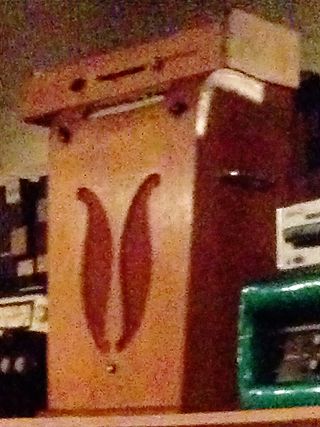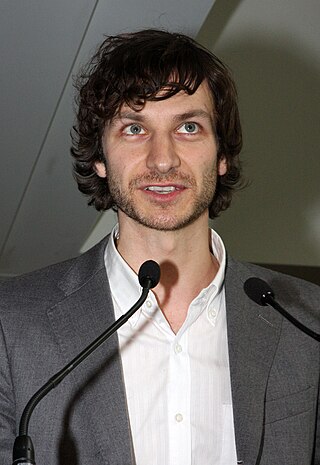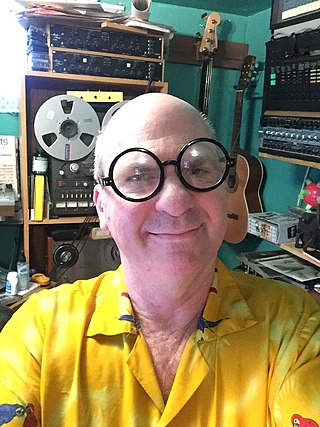
In music, tape loops are loops of magnetic tape used to create repetitive, rhythmic musical patterns or dense layers of sound when played on a tape recorder. Originating in the 1940s with the work of Pierre Schaeffer, they were used among contemporary composers of 1950s and 1960s, such as Éliane Radigue, Steve Reich, Terry Riley, and Karlheinz Stockhausen, who used them to create phase patterns, rhythms, textures, and timbres. Popular music authors of 1960s and 1970s, particularly in psychedelic, progressive and ambient genres, used tape loops to accompany their music with innovative sound effects. In the 1980s, analog audio and tape loops with it gave way to digital audio and application of computers to generate and process sound.
Perrey and Kingsley was an electronic music duo made up of French composer Jean-Jacques Perrey and German-American composer Gershon Kingsley. The duo lasted from 1965 to 1967 and both are considered pioneers of electronic music. They released under Vanguard Records two studio albums The In Sound From Way Out! and Kaleidoscopic Vibrations. They also were among the first artists to incorporate the Moog synthesizer, prior to the successful 1968 release, Switched-On Bach by Wendy Carlos.

Vanguard Recording Society is an American record label set up in 1950 by brothers Maynard and Seymour Solomon in New York City. It was a primarily classical label at its peak in the 1950s and 1960s, but also has a catalogue of recordings by a number of pivotal jazz, folk, and blues musicians. The Bach Guild was a subsidiary label.

The Moog synthesizer is a modular synthesizer invented by the American engineer Robert Moog in 1964. Moog's company, R. A. Moog Co., produced numerous models from 1965 to 1981, and again from 2014. It was the first commercial synthesizer and established the analog synthesizer concept.

Gershon Kingsley was a German-American composer, a pioneer of electronic music and the Moog synthesizer, a partner in the electronic music duo Perrey and Kingsley, founder of the First Moog Quartet, and writer of rock-inspired compositions for Jewish religious ceremonies. Kingsley is most famous for his 1969 influential electronic instrumental composition "Popcorn".

Moog is a 2004 American documentary film by Hans Fjellestad about electronic instrument pioneer Robert Moog. The film features scenes of Moog interacting with various musicians who view him as an influential figure in the history of electronic music.

The Ondioline is an electronic analog synthesizer, developed and built by Frenchman Georges Jenny. Sometimes referred to as the "Jenny Ondioline," the instrument is considered a forerunner of the synthesizer. First conceived by Jenny in 1939, he continued refining and reconfiguring the device, producing dozens of variant models up until his death in 1975.
"Baroque Hoedown" is an instrumental by the duet Perrey and Kingsley. Original from 1967 album Kaleidoscopic Vibrations a follow-up to their previous 1966 album, The In Sound From Way Out!. The two albums were reissued in 1988 on one compilation album entitled The Essential Perrey and Kingsley.

Jean Marcel Leroy, better known as Jean-Jacques Perrey, was a French electronic music performer, composer, producer, and promoter. He is considered a pioneer of pop electronica. Perrey partnered with composer-performer Gershon Kingsley to form the electronic music duo Perrey and Kingsley, who issued some of the first commercial recordings featuring the Moog synthesizer. Perrey was also one of the first to promote, perform, and record with the Ondioline, developed by Georges Jenny.

Wouter André "Wally" De Backer, known professionally as Gotye, is a Belgian-born Australian singer-songwriter and multi-instrumentalist. His 2011 single "Somebody That I Used to Know", reached number one on the Billboard Hot 100 and became the best-selling song of 2012. This made him the fifth Australian-based artist to top the chart and the second born in Belgium.
The Ruins of Athens, Op. 113, is a set of incidental music pieces written in 1811 by Ludwig van Beethoven. The music was written to accompany the play of the same name by August von Kotzebue, for the dedication of the new Deutsches Theater Pest in Pest, Hungary.

Vincent Edward Gambella, known as Vinnie Bell, was an American session guitarist, instrument designer and pioneer of electronic effects in pop music.

El Chavo ; — also known as El Chavo del Ocho during its earliest episodes – is a Mexican television sitcom series created by Roberto Gómez Bolaños (Chespirito) and produced by Televisa. It premiered on February 26, 1973 and ended on January 7, 1980, after 8 seasons and 312 episodes, and aired across Latin America and Spain.
The Turkish March is a classical march theme by Ludwig van Beethoven. It was written for the 1809 Six variations, Op. 76, and in the Turkish style. Later in 1811, Beethoven included the Turkish March in a play by August von Kotzebue called The Ruins of Athens, which premiered in Budapest, Hungary in 1812.

Dana Countryman is an American electronic music composer, songwriter and performer notable for his sustained presence in the Seattle Pop scene as well as his collaborations with French electropop artist Jean-Jacques Perrey. He is also well known as songwriter and performer for The Amazing Pink Things (1985–1991). as well as the publisher for Cool and Strange Music Magazine (1996–2003). Countryman is currently composing, performing and releasing original albums of retro vocal pop. Reviewer John Borack has described Countryman as "a one-man Brill Building," in reference to the New York-based songwriting and recording scene of the 1960s.
"The Lane" is a song by American recording artist Ice-T. It was released in 1996 as a single from the rapper's sixth studio album Ice-T VI: Return of the Real through Rhyme $yndicate Records/Virgin Records. The song was written and produced by Tracy "Ice-T" Marrow and Richard "DJ Ace" Ascencio. The single peaked at number 18 in the UK. "The Lane " was later included in the rapper's greatest hits album Greatest Hits: The Evidence.

The Amazing New Electronic Pop Sound of Jean Jacques Perrey is the sixth studio album by French electronic musician Jean-Jacques Perrey, released in 1968 on the Vanguard Records label.












